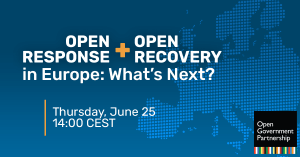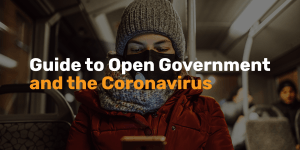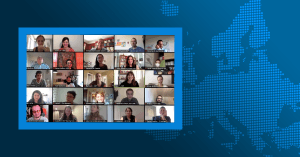Open Response + Open Recovery: Conversations with Europe’s Open Gov Community
Respuesta abierta + Recuperación abierta: Conversaciones con la comunidad de gobierno abierto de Europa
On June 25th, around 90 reformers from Europe’s OGP community convened for the online discussion ‘Open Response + Open Recovery in Europe: What’s Next?’. The discussion focused on how the community has been using the OGP platform during the pandemic and the impact on civic space. This is what we heard.
Collaboration is key to success
During the event, lightning talks were given by Bojana Selaković, Program Director of Civic Initiatives, Vasyl Zadvornyy, CEO of ProZorro, Niklas Kramer, Senior Policy Advisor at the Federal Ministry of Health of Germany, and Sanjay Pradhan, CEO of OGP. A common thread throughout all of these talks was the importance of citizen and civil society collaboration to deliver solutions and build trust during the pandemic, from providing community support and legal assistance, to civic monitoring of emergency procurement contracts, to developing a secure, open source contact tracing app.
Civil society is a crucial player
Our conversation clearly showed that the pandemic cannot be tackled by governments alone. Civil society, activists, journalists and ordinary citizens have played a critical role in responding to COVID-19. Collaboration among all these different actors has strengthened in many countries during the pandemic, with a real sense of solidarity emerging among citizens in order to help those most in need. In Bojana Selaković’s lightning talk, we learned how Serbian civil society came together to support vulnerable groups and deliver legal aidMore and better information about aid helps partner countries and donor institutions plan and manage aid resources more effectively, parliaments and civil society to hold governments accountable for t... during the pandemic.
That said, the pandemic is posing a real challenge for civil society sustainability. Donors, international organisations and governments must continue to provide space and funding for civil society organisations to continue their activities.
Digital concerns
Public concern about privacy and surveillance has grown under the pandemic. As we heard from Niklas Kramer, it is imperative that governments work together with civil society and citizens when building track and tracing tools and place transparencyAccording to OGP’s Articles of Governance, transparency occurs when “government-held information (including on activities and decisions) is open, comprehensive, timely, freely available to the pub... More and accountability at the center of these efforts to ensure that citizens’ right to privacy is not eroded under these exceptional circumstances.
From schooling and conferences, to family reunions and Zoom weddings, many of our lives have become digital. But this is simply not the case for everyone. Not all children have access to sufficient high-speed internet to carry out their studies. Many elderly citizens are not well-connected, particularly in rural areas. The digital transition under the pandemic risks leaving some people behind and needs to be addressed quickly by governments. Furthermore, all members of society, including governments, need more educationAccountability within the public education system is key to improving outcomes and attainment, and accountability is nearly impossible without transparent policies and opportunities for participation ... and training on digital safety and security.
See the privacy protections module from OGP’s Guide to Open Gov and the Coronavirus and Taking the OGP Process Online.
Open gov rollbacks
Europe has seen some significant open gov rollbacks under COVID-19. Eight European OGP members have documented suspensions or alterations to their regular right to informationThe legal right to request information from the government allows the public to follow government decision-making, participate in ensuring better decisions, and hold the government accountable. Techni... procedures. When it comes to freedom of assemblyPeaceful assembly — a fundamental human right — is essential to healthy and effective democratic institutions. Technical specifications: Protection of the individual right to peacefully assemble, ... More, more than 3 in 4 OGP countries in Europe imposed measures during the pandemic that prevented people from meeting others outside of their household unless strictly necessary. This is nearly double the rate of other regions, and in some countries, worryingly, there are no time limits for these restrictions. Furthermore, judicial oversight has been severely affected in at least two countries from the region. Governments need to ensure that any restrictions or limits used to curb the pandemic are proportional, transparent and time-bound.
For more recommendations, see the civic space module from OGP’s Guide to Open Gov and the Coronavirus.
OGP in times of crisis
OGP remains an important platform for many countries to continue dialogue between government and civil society during the pandemic and an avenue to make concrete commitments related to the response to COVID-19. Even where action planAction plans are at the core of a government’s participation in OGP. They are the product of a co-creation process in which government and civil society jointly develop commitments to open governmen... co-creation processes have slowed down or paused, using multi-stakeholder forums and the open government community as a means to discuss the response to the pandemic has been crucial.
However, this is not the case in all countries. In some places OGP has lost momentum. Governments and civil society should sustain the OGP process through multi-stakeholder dialogue, and work with the OGP Support UnitThe OGP Support Unit is a small, permanent group of staff that work closely with the Steering Committee and the Independent Reporting Mechanism to advance the goals of the Open Government Partnership.... and Steering CommitteeThe Steering Committee is OGP’s executive decision-making body. Its role is to develop, promote and safeguard OGP’s values, principles and interests; establish OGP’s core ideas, policies, and ru... to get processes back on track.
Road to recovery
As Europe begins to slowly open up again and look towards recovery, governments must adopt an open approach and open communication about next steps in order to build trust in a society that has been profoundly affected by the events of the last months. For example, when governments roll out stimulus packages, the spending must be transparent, accountable and open to public scrutiny. Some participants at the discussion suggested a need to explore a global transparency standard for these stimulus packages.
For more information, check the fiscal openness module of the Guide to Open Gov and the Coronavirus.
In sum, our conversation highlighted the need for an open approach to build mutual trust between governments and citizens and to develop effective solutions to address the coronavirus, and how OGP can be used as a platform to deliver on these.
On June 25th, around 90 reformers from Europe’s OGP community convened for the online discussion ‘Open Response + Open Recovery in Europe: What’s Next?’. The discussion focused on how the community has been using the OGP platform during the pandemic and the impact on civic space. This is what we heard.
La colaboración es clave para el éxito
Durante el evento, Bojana Selaković, directora de programas en Civic Initiatives, Vasyl Zadvornyy, director ejecutivo de ProZorro, Niklas Kramer, asesor de política senior del Ministerio Federal de Salud de Alemania, y Sanjay Pradhan, director ejecutivo de OGP ofrecieron charlas relámpago. Un tema común a todas las charlas fue la importancia de la colaboración con la ciudadanía y la sociedad civil para promover soluciones y fortalecer la confianza durante la pandemia, por ejemplo ofreciendo apoyo comunitario y asistencia legal, monitoreando los contratos públicos durante la emergencia o desarrollando aplicaciones de rastreo seguras.
La sociedad civil es un actor clave
La conversación dejó claro que los gobiernos por sí mismos no pueden resolver la pandemia. La sociedad civil, activistas, periodistas y ciudadanos han jugado un papel crucial en la respuesta al COVID-19. La colaboración entre todos estos actores se ha fortalecido en muchos países durante la pandemia y ha surgido un verdadero sentido de solidaridad entre los ciudadanos para ayudar a quienes más lo necesitan. Por ejemplo, en la charla de Bojana Selaković, escuchamos que la sociedad civil de Serbia se ha reunido para ayudar a grupos vulnerables y ofreciendo asistencia legal durante la pandemia.
Sin embargo, la pandemia representa un reto serio para la sostenibilidad de la sociedad civil. Los donantes, organizaciones internacionales y gobiernos deben seguir ofreciendo el espacio y los fondos necesarios para que las organizaciones de la sociedad civil pueden continuar sus actividades.
Preocupaciones digitales
Durante la pandemia se han exacerbado las inquietudes sobre la privacidad y la vigilancia. Como lo comentó Niklas Kramer, es necesario que los gobiernos trabajen con la sociedad civil y la ciudadanía en sus procesos de desarrollo de herramientas de seguimiento, asegurando que la transparencia y rendición de cuentas sean el centro de dichos esfuerzos, de manera que la privacidad de la ciudadanía no se vea afectada durante estas circunstancias excepcionales.
Clases de escuelas, congresos, reuniones familiares y hasta bodas por Zoom. La vida de muchos de nosotros se volvió digital. Pero esto no aplica para todos. No todos los niños tienen acceso a internet con la suficiente velocidad para continuar con sus estudios y muchos adultos mayores no tienen conectividad, en particular los que viven en áreas rurales. La transición digital que se ha registrado durante la pandemia podría dejar a muchos atrás y esto debe ser atendido por los gobiernos. Además, todos los miembros de la sociedad, incluyendo los gobiernos, requieren de una mayor capacitación en temas de seguridad digital.
Consulta el módulo de protección a la privacidad en la Guía de gobierno abierto y el coronavirus y Cómo llevar el proceso de OGP a un espacio virtual.
Repliegues del gobierno abierto
En el marco del COVID-19, en Europa se han registrado repliegues significativos al gobierno abierto. Ocho miembros de OGP de Europa han documentado suspensiones o alteraciones a sus procedimientos de acceso a la información. En cuanto a la libertad de asociación, más de 3 de cada cuatro países de Europa han impuesto medidas durante la pandemia, restringiendo las reuniones fuera de los hogares de las personas a menos que sea estrictamente necesario. Este dato es casi el doble que lo registrado en otras regiones y en algunos países no hay límites en el tiempo a estas restricciones. Adicionalmente, la supervisión judicial se ha visto seriamente afectada en por lo menos dos países de la región. Los gobiernos deben asegurar que las restricciones o límites establecidos para limitar la pandemia, sean proporcionales, transparentes y limitados en el tiempo.
Para mayor información, consulta el módulo de espacio cívico de la Guía de gobierno abierto y el coronavirus.
OGP en tiempos de crisis
OGP sigue siendo una plataforma importante en muchos países para continuar el diálogo entre el gobierno y la sociedad civil durante la pandemia y como un medio para establecer compromisos concretos sobre la respuesta al COVID-19. Incluso en países en donde el proceso de cocreación se ha entorpecido o pausado, los foros multisectoriales y la comunidad de gobierno abierto han sido fundamentales en las discusiones sobre la respuesta a la pandemia.
Sin embargo, esto no ha ocurrido en todos los países. En algunos, OGP ha perdido impulso. Los gobiernos y la sociedad deben mantener el proceso de OGP a través del diálogo multisectorial y trabajar con la Unidad de Apoyo de OGP y el Comité Directivo para retomar el proceso.
Road to recovery
Europa está iniciando la reapertura y mirando hacia la recuperación. En ese contexto, los gobiernos deben adoptar metodologías abiertas y una comunicación abierta sobre los siguientes pasos para desarrollar la confianza en una sociedad profundamente afectada por los eventos de los meses pasados. Por ejemplo, cuando los gobiernos despliegan paquetes de estímulos, el uso de recursos debe ser transparente, responsable y abierto al escrutinio. Algunos participantes de la discusión han sugerido la necesidad de explorar un estándar global de transparencia para estos paquetes de estímulos.
Para mayor información, consulta el módulo de apertura fiscal de la Guía de gobierno abierto y el coronavirus.
En resumen, la conversación destacó la necesidad de impulsar un modelo abierto hacia la construcción de la confianza mutua entre los gobiernos y la ciudadanía, desarrollar soluciones efectivas para atender la pandemia y cómo podemos utilizar la plataforma de OGP para implementarlas.
No comments yet
Related Content

Open Response + Open Recovery in Europe: What’s Next?
In this series of lightning talks, European reformers explore how to keep open gov values forefront as the region moves through pandemic response and recovery. Watch the recording...

A Post-Covid-19 Social Compact Rooted in Openness and Citizen Engagement
The European Commission has been instrumental in the swift European response to the pandemic, playing a critical role in flattening the curve. The bigger challenge is ahead.

A Guide to Open Government and the Coronavirus
This guide is a one-stop shop for the best current resources on how open government projects and approaches can support tackling the pandemic.


Leave a Reply